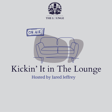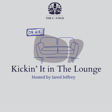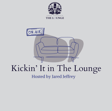Introduction and Host Setup
00:00:00
Speaker
The views expressed on this podcast represent only those of the hosts and do not represent the views of the Student National Medical Association. Hey, everybody. Jared Jeffrey here, your usual host for Kicking in the Lounge.
00:00:11
Speaker
But today I'll be taking a step back and I'll be allowing the JSNMA to run the show. They'll be conducting an interview with the president of Meharry Medical College on historically black medical schools.
00:00:24
Speaker
Please give the JSNMA a very warm welcome. And without any more delay, here is the show.
Introduction of Dr. James Hildreth and Bloomberg Donation Discussion
00:00:31
Speaker
Hello everyone, my name is Abena Prempeh, a second year medical student here at Meharry Medical College and I'm here this afternoon with Dr. James Hildreth, who's the current president and CEO of Meharry Medical College.
00:00:45
Speaker
And Dr. Hildreth, first I want to thank you for your time this afternoon and I'm just looking forward to hearing your insights regarding the Bloomberg donation and hearing how it has impacted the institution so far and how and how it will continue to impact in the future.
00:01:04
Speaker
And to dive right into questions, we all remember that day on August 6th, where we heard the news that Meharry was one of the four HBCUs to receive a $175 million dollars grant um from blueberg Bloomberg Philanthropies, and how it would go...
00:01:23
Speaker
um it would go to our endowment. so first, I would like to, can you just educate us on what exactly is an endowment?
Understanding Endowments with Dr. Hildreth
00:01:32
Speaker
Sure. So endowments are funds that are owned by an institution or university that are in investment equities, stocks, could be bonds, sometimes could be real estate.
00:01:49
Speaker
But the whole idea is that these investments will grow over time and provide a source of revenue or resources to the institution that are unrestricted, that can be used in whatever way an institution might choose. So, for example, if you have an endowment of $100 million dollars and it grows by, i don't know, 6% or 7%, that means there's a $7 million dollars growth in that endowment.
00:02:18
Speaker
And if you choose to use, say, half of it, $3.5 million, You have that to use for your programs, but the other $3.5 million goes back, and that way the endowment grows. So over time, you have more and more unrestricted resources to use as you see fit.
00:02:35
Speaker
And that's very different from getting a grant or a contract where how you use the funds is specified by the donor or by the contract you engage in. And so one of the beauties of endowments is that over time, you have the power of Compounding interest and time, that combination can mean some pretty spectacular growth in the endowment. My Harry's endowment started at $20 million, dollars maybe a couple of decades ago or more.
00:03:07
Speaker
And with the Bloomberg gift, it now stands just under $380 million, which I think is the second or third largest endowment among HBCUs. Yeah, and with that being said, you know, how do you do anticipate any challenges?
Challenges of Managing Large Funds
00:03:24
Speaker
i know there's a lot of benefits to having an increase in your endowment, as you just explained, but do you anticipate any challenges in handling, like, such larger funds?
00:03:36
Speaker
No, we ultimately, the Board of Trustees Meharriot, they're responsible for how the endowment is managed and Within the Board of Trustees, there's a finance committee, and these are board members who have an expertise in all things financial, bankers, et cetera.
00:03:57
Speaker
And the board sets spending policies that determine how much discretion i say as president would have in using those funds. You also have to keep in mind that some of the funds in the endowment are restricted.
00:04:13
Speaker
So when, for example, if a donor decides to endow a professorship, we cannot use those funds for anything other than supporting that professorship that the donor has given the funds for.
00:04:26
Speaker
And I think most of our endowment, the great majority of the funds in our endowment are restricted. Restricted, okay.
Historical Context of HBCU Endowments
00:04:35
Speaker
And on the topic of endowments, studies have shown that historically black colleges and universities have significantly lower endowments compared to predominantly white institutions.
00:04:48
Speaker
And I just want to hear more of your insight on where it currently in 2025 now, and you would think the gap would close a little bit more, but can you explain like, why do you think that this still exists?
00:05:02
Speaker
And, and also how does this impact the students who do attend historically black colleges? Well, One of the things that endowments allow you to do is to make investments in your infrastructure.
00:05:18
Speaker
And what I mean by that is, you know, new buildings, new equipment, starting new programs that require some discretionary funds to get them started.
00:05:30
Speaker
These all things that can advantage students and have them have a much better experience, learning experience and otherwise experience when they go to those institutions.
Impact of Racial Disparities on Donations
00:05:42
Speaker
One thing that people need to understand is that Meharry Medical College has, I believe the current number is 7,000 alums who are dentists, physicians, researchers.
00:05:55
Speaker
And while some of them have done quite well, the majority of them have not done as well, quite honestly, if they had not it's a as if they were white or had gone to a white institution. I'll give you one example. and Many decades ago, if you were a black physician, whether you graduated from Meharry, Howard, Drew, Morehouse, there were redlining laws that prevented you from accumulating wealth.
00:06:26
Speaker
by buying property, there were restrictions against which hospitals you get privileges in. So what that meant is that black physicians being among the highest earners among black people were not able to accumulate the wealth that white physicians could and other white professionals could, and that's been a disadvantage for us.
00:06:48
Speaker
We have alums who give, and they give generously based on how much resources they have available to them. But it's not the same as some of the alums of the other institutions who did not have the same barriers that that our black alums have had.
00:07:06
Speaker
me give an example. When I was a medical student at Johns Hopkins, I did a sub-internship in urology, and i was very excited about it. And in fact, I gave some serious thought to becoming a urologist because they do everything.
00:07:23
Speaker
At least when I was doing my sub-internship, there was surgery. There was some internal medicine in there. ah There was even some reading of of images.
00:07:36
Speaker
So it was really ah amazing the range of things that was very excited. So as a sub-internship, I took care of a really wealthy, individual from Brazil.
00:07:49
Speaker
He had come to Johns Hopkins to be treated by Pat Walsh, who perfected what he called a radical prostatectomy. It was a surgical technique that allowed you to remove prostate cancer, but preserve sexual function.
00:08:05
Speaker
Because back then, the removal of the prostate to deal with prostate cancer would almost inevitably leave the man and impotent. And so Dr. Walls, having developed this technique, attracted men from all over the world with the with the means to do so to come and have the surgery performed by him.
00:08:26
Speaker
So, you know, and I basically did all the scut work. And I sort of watched in amazement as when this individual got back to Brazil, he wrote Hopkins a huge check, many millions of dollars.
00:08:41
Speaker
In gratitude for what had happened, he sent me a silk tie, really nice silk tie that I never wore because I didn't have anything nice enough to wear with. But my point is, we provide excellent care to patients as well, but very few of our patients, in fact, I'm not aware of any of our patients who could write us a multimillion dollar check in gratitude.
00:09:08
Speaker
So those are the kinds of things that disadvantage us over some other institutions. It's our mission, it's what we focus on, and it's institutional racism that goes way back.
00:09:21
Speaker
Yeah, yeah, thank you for making those connections. Sometimes you don't really think about it, but hearing you speak about it, it's very obvious.
Supporting Meharry's Mission through Endowments
00:09:30
Speaker
And also, like, moving to the next question, I just wanted to know, so I know previously you have said that the endowment is restrictive, but do you see or do you have any idea of how the endowment will help like improve your mission on health caring because I know like a lot of what Meharry does is caring for the underserved.
00:09:57
Speaker
one of the things I hope the endowment will do is to allow us to continue to graduate students who will choose to serve the underserved.
00:10:08
Speaker
That's been something we've been very proud of as a matter of fact.
00:10:14
Speaker
I think even now, as many as 80% of our graduates from the medical school and the dental school will choose to serve in underserved areas. And that's something I think that's very impactful for us as an institution.
00:10:30
Speaker
But if the debt burden of students keeps increasing, it's going to be increasingly challenging to make that choice. So by being able to offer substantial, truly substantial scholarship support to reduce the debt burden of as many students as possible, we believe it's gonna make it possible into the future for our students to continue to make that choice.
00:10:57
Speaker
And I hope it will also allow us to keep attracting students who want to make that choice. And so I think that that is one of the enduring effects of getting these large gifts from Mr. Bloomberg is going to have for us.
00:11:12
Speaker
And we're hoping and trying to nurture other gifts. They may not be quite as large as that, but we're hoping to get some additional large gifts to allow us to keep focusing on that mission that we're so proud of.
00:11:24
Speaker
Yeah, and if I can add, I know when I was applying to medical school, one of my biggest fears was I also want to enter primary care, specifically be a junior geriatrician. yeah And ah big fear of mine is, am I going to be able to pay back this debt while still serving an underserved community? And so it is something that was on my mind before and is still on my mind today. So thank you. Yeah, and we're we're trying to...
00:11:53
Speaker
find donors who'd be willing to... want it Well, let me back up. One of the concerns expressed by some we've spoken to is... what if we provide these scholarship support and the student changes their mind and instead of going into primary care, they become an orthopedic surgeon or, you know, dermatologist have a need to serve. But anyway, the point is, what if having given the gift to reduce the debt burden, the student then chooses to do something other than what we predicted them to do. So there are two things. One is,
00:12:32
Speaker
the the law the the tuition scholarship can be converted to a loan. In other words, if you receive the scholarship in anticipation of you choosing to become a primary physician or serving the underserved and you change your mind, you would then fall into the same category as all the other students.
00:12:55
Speaker
And that becomes a loan and not a scholarship. In fact, we're doing that with our program that's sponsored by the state, the accelerated training program, where our students admitted to the program have all of their tuition, undergraduate and medical school tuition, paid by the state of Tennessee.
00:13:14
Speaker
And in return for that, these students are agreeing to practice medicine in areas of need in Tennessee. And if they choose not to do so, all that scholarship support is converted to a loan.
00:13:29
Speaker
The other thing that I think that it would be attractive to some donors would be to say, After the student graduates and some of them have made their choice of primary care or something related to it, then we know that they're committed and then we give them the the the scholarship and reduce their debt.
00:13:50
Speaker
And I think that that's something that's going be very appealing to some donors. And I'm working on that myself to try to make that happen. Yeah, that I'm sure like a lot of students would be excited to yeah have that have those options. Absolutely, absolutely.
Attracting Donations through Meharry's Strengths
00:14:04
Speaker
And also, i know after Bloomberg's donation, it didn't just stop there. There was an anonymous donor who gifted the school $20 million. Correct. And then also the computational sciences school also received a $600,000 grant from or a donation from. From the CA.
00:14:24
Speaker
Yeah. So why do you think Meharry is like receiving these donations? And what what are the school's strengths that appeal to donors?
00:14:34
Speaker
So I think that what people are seeing is the value of the programs that we have tried to start. And our North Star continues to be both in the direct services we provide and the students we train and send out into the world of trying to serve the underserved and making sure those who otherwise would not have an opportunity to heal or be healed and become healers, that that is what we're doing.
00:15:06
Speaker
mean, I started the School of Applied Computational Sciences. I wanted to start it because the lack of diversity in data science and artificial intelligence.
00:15:17
Speaker
And no one is perhaps intentionally biased, but The fact is that in artificial intelligence and some of the things that happening in data science, the people who do the work and the products they produce do not sufficiently represent all of us, especially minorities.
00:15:42
Speaker
And so the programs that Dr. Mislanka, our founding dean, has started in the School of Applied Competition Sciences will almost single-handedly change the profile of data scientists and those individuals who do artificial intelligence.
00:15:57
Speaker
The numbers are so small that our one school and the students that we're enrolling that are predominantly from minority backgrounds will have a profound impact on on the makeup of those professions, but more importantly will help to prevent bias from being introduced into algorithms and the other things that come out of artificial intelligence.
00:16:19
Speaker
So I think people are seeing both the quality of the individuals we're recruiting who are leading our schools, but also the impact that our programs are having in the real world. And I think that's very appealing, and people are gravitating to that.
00:16:34
Speaker
Yeah, I also think that there's definitely a need for more students that more health care providers that do come from institutions like Meharry, because I know ah big problem in health care today is patients feel that their doctors are not listening to them or their doctors are missing important diagnoses due to just not having that not having that health caring ideals. Right.
00:17:00
Speaker
And many times outcomes are not as a as good as they could be because the patient does not truly believe the provider has their best interest in mind. and So if the trust is not there, prescriptions won't be filled.
00:17:19
Speaker
visits won't be honored. I mean, it's really important that that connection be made. And I think that's why it's really important for us to do the work that we're doing ah because we are a trusted
Concerns of Current Administration on DEI Initiatives
00:17:31
Speaker
organization. And i think that's why, for example, Oracle decided to partner with us, which is a really big deal.
00:17:41
Speaker
And my next question to you is, so currently the diversity, equity, and and inclusion initiatives, they are currently under scrutiny, um especially with the new administration that we have. And I'm just curious to know, is there a fear that there may be a lack of donors that will...
00:18:08
Speaker
give to um institutions like Meharry? Well, to be sure, there's going to be a chilling effect of ah what is happening. It's not just a hope they have. They're actually doing this. For example, just ah two days ago, it was announced that all the people who work at the VA are who have DEI in their title, they've been let go.
00:18:35
Speaker
All the federal funding unrelated to Medicare, Medicaid has been suspended together the to give the administration time to parse out which programs are focused on DEI so they can be ended and then all the other programs continue.
00:18:55
Speaker
As a point of fact, Meharia and other HBCUs, of course, have significant funding from the federal government that's used for student support, information technology support. There are a number of things that are in jeopardy based on what we see are happening with the new administration.
00:19:16
Speaker
So we're trying to plan for and take steps to mitigate the impact of this. And we're hoping that it will be a short-term thing, meaning for a number of years perhaps.
00:19:29
Speaker
But there's no question about that, what the administration has done. It's sending a chilling effect, not just in the corporate world, but in in foundations as well.
00:19:40
Speaker
um And to give an example, the day after the election, I believe it was the day after the election or shortly thereafter, Walmart, which is one of the largest corporations in the world,
00:19:52
Speaker
announced they were ending all of their DEI programs across the whole corporation. they They ended them. um And so this is having a real-world effect, and it's happening here and now. It's not hypothetical. It's actually happening.
00:20:09
Speaker
So we feel like the leadership of the college, we've got to take steps to prepare for it, and we're trying our best to do so. ah would you be able to give any insight on how, what kind of steps you are taking as a institution?
00:20:21
Speaker
for example, um whatever sorts of, and we have very limited discretionary funds that we have, we're trying to make sure that those those can be preserved for critical needs, such as critical staff, critical student programs.
00:20:41
Speaker
So we're trying to be very intentional about saying, What are the absolutely essential things we have to do? And then I'm looking to the board, the board of trustees for their support to find the resources we need to keep those things going.
00:20:56
Speaker
And that's one of the advantages of having an endowment because it gives you at least some ability to weather financial storms like the one we are about to enter into.
00:21:07
Speaker
But there's no question that the impact is going to be significant and we're just doing our best to make sure we're going to be prepared for it. And so with the current ah limitation the current limitations on DI, has it, well, we see that it's but to potentially impacting Meharry as a college.
00:21:29
Speaker
Is it impacting the hospital as well? Well, certainly as a safety net hospital, there are federal funds that flow to it that are different from the ones that flow to non safety net hospitals, in which case ours is primarily focused on minority communities. So there is a concern there.
00:21:52
Speaker
um But there are other kinds of programs like Title III. Title III are funds that come out of the Department of Education and they're specifically for small institutions, HBCUs, to make sure they can have adequate programmatic support for their learners.
00:22:12
Speaker
IT, t for example, information technology, partially supported by Title III. Security is partially supported by so they So we're talking about some potentially very hurtful, harmful things that might come out of this if the agenda of the current administration is fully implemented.
00:22:33
Speaker
And we're trying our best to be prepared for it. Thank you for sharing.
Positive Student Impact of Bloomberg Gift
00:22:38
Speaker
and to go back onto how the endowment will affect students, I am curious as in has it, have current students already been affected, positive obviously positively by the um current by the endowment? And if so, in what ways?
00:23:01
Speaker
So one benefit that came out of the first Bloomberg gift, which is $34 million. 2020? 2020. And $28 million of that was for direct student And 280 students $100,000 of debt reduction, which very significant. The other $6 million used wraparound services that just benefit was for direct student support and two hundred and eighty students got a hundred and thousand dollars ah debt reduction which was very significant the other six million dollars was used for uparound services that
00:23:33
Speaker
didn't just benefit the 280 students, but benefited all the students in the School of Medicine. One of the challenges I have is that Mr. Bloomberg's focus, and it's his right to have that focus, is on medical students.
00:23:49
Speaker
And of course, we have four other schools. And in fact, the School of Dentistry, those students have higher debt than even the medical students. So I tried my best to get the Bloomberg team to allow us to have this latest gift benefit both medical students and dental students. I didn't quite get there. I'm going to keep trying.
00:24:10
Speaker
um But those ancillary services that are also paid for by the Bloomberg gifts, including the current one, benefit all the students, not just the students who are in medical school.
00:24:25
Speaker
And the other thing is that by having endowment focused on scholarships, it'll freeze up some scholarship dollars that will otherwise go to medical students that we might be able to direct to other students.
00:24:40
Speaker
So it's definitely having a very positive impact, not the least of which is being able to offer possibly for the first time full ride four-year scholarships, tuition scholarships to many, many students, oh wow which is very exciting.
00:24:59
Speaker
and And so my last question to you,
Role of Student National Medical Association
00:25:03
Speaker
Dr. Hildred, is so Meharry and Howard, both recipients of the grant or the Bloomberg donation, are also founding members of the Student National Medical Association, also known as the SNMA.
00:25:16
Speaker
And i would just like... For your input and your insight on how organizations like the SNMA have impacted Meharians and yeah, how have they impacted Meharians?
00:25:31
Speaker
So I think it's been, especially in the early days when black medical students could not be part of the white student national organizations.
00:25:41
Speaker
And as you might imagine, you might that's how the National Medical Association came to be for exactly the same reasons. So I think that especially in the earliest days of its founding, SNMA represented a really important way for lifetime, you know, friendships and collaborations could be formed that I think were very important in identifying future leaders.
00:26:09
Speaker
I think the SNMA provided some great feedback to leaders like myself of things that were working well and things that are not working so well. So in terms of how we've come to where we are right now, to the extent that student leaders, especially those involved in SNMA, have been giving advice and counsel to deans and presidents and all this, think the SNMA has been a very important organization.
00:26:36
Speaker
And I truly believe it represents the, I don't know, the launching of some great leaders for the future. And we are really proud that Meharry was one of the two institutions that gave birth this organization.
00:26:54
Speaker
We hold it as a point of pride. Yes, I can also speak to the SNMA creating or leaders. I know coming to medical school, I was and I still am like really quiet and shy, but just being able to participate and gain leadership roles has allowed me to be a better advocate as well as like as well as organize myself as a student also as a future provider.
00:27:21
Speaker
So thank you for sharing.
Conclusion and Closing Thoughts
00:27:23
Speaker
and And again, I want to thank you, Dr. Hildreth, for your time this afternoon. It was really a pleasure speaking to you and hearing about what is what is going on with the Bloomberg donation, as well as how it is currently impacting the school today and how it will continue to advance the institution.
00:27:42
Speaker
And I just really hope that... the donations such as the one from Bloomberg continue to shine a light on the importance of diversity within um the field of health care. So thank you again for your input. You're you're most welcome. And i think that the gift from Bloomberg validated the value of what we do here, the value of diversity, the importance of it, and the fact that a $20 million dollars unsolicited anonymous gift followed it is, again, a testament to that. So
00:28:15
Speaker
But I also think this cannot be denied. We have some amazing students who come to our organizations, and they go on to do amazing things. And so we're very excited about that as well.
00:28:28
Speaker
Yes, I am also looking forward to seeing how this will continue to foster the next generation of health care leaders. So again, thank you so much. Thank you for having me.
00:28:38
Speaker
was a pleasure. you.











